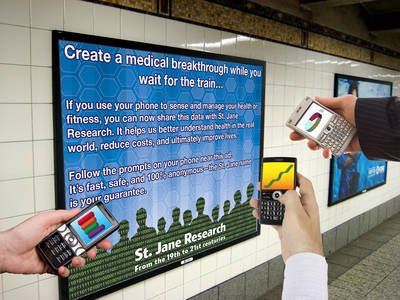Future Now
The IFTF Blog
What if Self-Tracking Goes Mainstream?

Does the future include everyone measuring themselves in some way and contributing that data to research? Quite possibly, but it’s more complicated than that.
As part of IFTF’s release of the HealthCare 2020 map, the above “artifact from the future” was made public. It’s called Validation of Quantified Selves, and it’s the idea that widespread self-tracking will lead to integration of patient-generated information in research and development treatment practices.
In case it’s too small to read, the picture above says:
“Create a medical breakthrough while you wait for the train...
If you use your phone to sense and manage your health or fitness, you can now share this data with St. Jane Research. It helps us better understand health in the real world, reduce costs, and ultimately improve lives.
Follow the prompts on your phone near this ad. It’s fast, safe, and 100% anonymous - the St. Jane name is your guarantee.
St. Jane Research
From the 19th to 21st centuries”
Parts of this idea are already happening today.
For starters, the idea of “data donorship” is starting to emerge. The Lance Armstrong Foundation used this term in one of their recent presentations. And a direct example of this idea is TuAnalyze, a new application launched as a partnership between TuDiabetes.org, a social network for people touched by diabetes, and Children's Hospital Boston.
The application enables members to submit a key health metric known as Hemoglobin A1C as part of a massive data donation drive. The information submitted by members will be displayed in a map of the United States on the TuDiabetes network, with states lighting up according to the aggregate A1c data. Once a threshold of participants in each state is reached, the state's color reflects whether the average A1c submitted is within the range recommended by physicians.
In a press release, Manny Hernandez of TuDiabetes said, "Analysis of the data collected could determine, for example, trends or a correlation between people's participation in health related social networking and level of diabetes management."
But wait, you might ask, not everyone will want to collect data about themselves? Will Quantified Self really go mainstream?
Consider the concept of “reality mining,” where invisible streams of data are collected on your behalf without you having to sit down and crunch numbers in a spreadsheet. Self-tracking becomes part of the fabric or background of life.
Professor Sandy Pentland at MIT is working on this - he’s looking at data gathered by cell phones to learn about human behavior and illness trends.
Using sensors to detect voice tone, pitch, location, and patterns of communication, Pentland can predict if people are depressed or likely to come down with the flu. Pretty amazing, right? The best part is that people can derive value from the data, and choose to share these streams with their friends or doctor, without actually doing any tracking themselves.
And for those that do love to track, what are they currently tracking? What’s the most exciting leading edge of Quantified Self? I get this question a lot, and here’s my answer.
The main overlapping circles of things people track are: fitness, health, sleep, mood, time/productivity, energy, location, lifestyle/family, money, social media patterns, learning/cognition, and general lifelogging. It's really all exciting right now, because there are so many more questions than answers. We have all this data but aren't always sure what to do with it yet.
Another layer that's happening is the data aggregators, who are starting to pull in data from all these different sources and combine them into visualizations that help you have an overall picture of yourself. Farther out, the real benefits will come when it's not just the Quantified Self, but many quantified selves sharing their data to compare, learn, and make aggregate discoveries. There are so many basic human processes, like sleep, that we actually know very little about, so as people start to track themselves and compare their data, we'll be able to learn what influences sleep and how sleep influences our lives. That's just one of hundreds of examples that we'll start hearing about as more socially run experiments pop up.
So what do you think? Will Quantified Selves become the norm, whether actively or passively? Will data play an increasing role in our lives? How do you feel about that? Let me know on Twitter @accarmichael or @iftfhealth.



